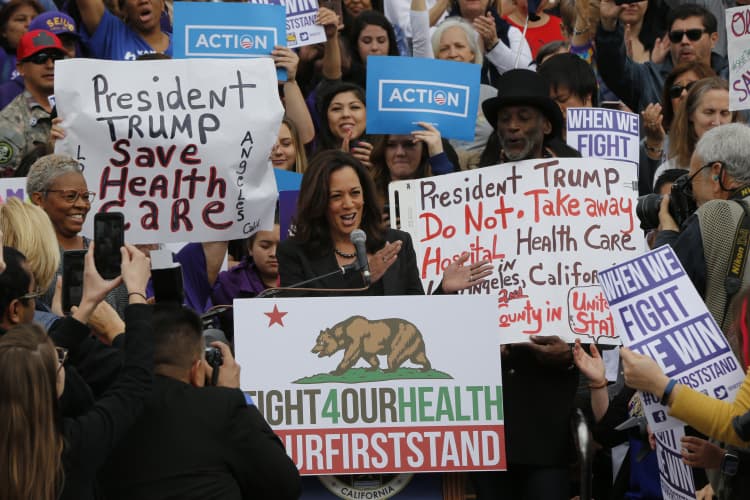Healthcare Remains a Potent Issue for Voters
Healthcare is an ever-present issue for Americans, and 2024 is no exception – even in an election cycle in which inflation and other economic concerns are at the top issue of voters’ minds.
RealClear Opinion Research asked voters what single issue is most important in deciding how to vote in November, and respondents said “the economy” at 33% – nearly as much as the next three issues combined: immigration (13%), abortion (11%), and democracy (10%). These responses are typical – most surveys see these four issues cited above any other.
The recent RealClear survey, sponsored by the Pharmaceutical Research and Manufacturers of America, the industry’s trade association, found that 6% of voters named senior services (Social Security, Medicare, etc.) as their top issue, while 4% cited health insurance costs and coverage.
Combining these two categories brings the total up to 10%. Parsing the data more closely, it’s clear that healthcare remains a potent issue: The issue of abortion is framed by Democrats as a matter of women’s health, and many Americans worried about their financial situation are anxious about rising medical costs.
Kamala Harris’ presidential campaign is especially attentive to this dynamic. The vice president is recycling Democrats’ tried-and-true playbook on both healthcare and abortion. Democrats took control of the House halfway through Donald Trump’s presidency in large part by emphasizing threats to the Affordable Care Act and painting Trump as a major risk to Americans’ health security. In 2022, Democrats blunted the predicted Republican “red wave” in part by stressing their pro-choice credentials on abortion.
“Together, Tim Walz and I will strengthen the Affordable Care Act, continue to take on Big Pharma, and cap the cost of prescription medication for all Americans,” Harris wrote Oct. 7 on X. “Because we believe that health care should be a right – not just a privilege for those who can afford it.”
Harris has coupled these words with an ad blitz highlighting Trump’s words – or lack thereof – on health care and attacking him constantly on the issue of abortion. A recent Harris campaign spot lambasted Trump over his recent assertion in answer to a question about whether he still wants to repeal Obamacare with the claim that he has “concepts of a plan” in mind.
In a statement, the Trump campaign fired back at Harris’ characterizations.
“Kamala Harris is lying because she is losing. President Trump is not running to terminate the Affordable Care Act – he is running to make healthcare affordable again by increasing transparency, promoting choice and competition, and expanding access to new affordable healthcare and prescription drug options,” said Karoline Leavitt, a campaign spokesperson.
“President Trump will keep his promise to make America affordable and healthy again when we elect him in November.”
Although much focus has been placed by both campaigns and the media on the Affordable Care Act, RealClear Opinion Research found that voters do not think of it as the most pressing healthcare-related issue. Respondents cited “out-of-pocket expenses” (35%) and “cost of health insurance premiums” (32%) as the most important healthcare-related issues ahead of the election. Other popular answers were “cost of prescription medicines” (25%), “protecting the Affordable Care Act” (16%), “cost of hospital services” (16%) and “protecting those with pre-existing conditions” (13%).
Still, Democrats see the issue as a winning one for their ticket. The Harris-Walz healthcare plan – unveiled in early September – pledges to “make affordable health care a right, not a privilege by expanding and strengthening the Affordable Care Act.”
Earlier this year, Trump revived previous calls to repeal the law and replace it with something better, though he has yet to describe what that better plan would look like. His running mate, J.D. Vance, has tried to fill in some of the blanks, saying that Trump’s plan would focus on deregulating the insurance markets to promote choice and “not have a one-size-fits-all approach” of putting everyone into the same insurance risk pool.
RealClear Opinion Research shows, however, that more Americans are concerned with out-of-pocket costs than almost anything else. When asked whether “paying lower out-of-pocket costs when they need care or medicine” is more important than “paying a lower premium each month,” 62% of respondents said the former was more important.
Healthcare is not as partisan an issue as party leaders and media might paint it to be: Sixty-four percent of Democrats believe lower out-of-pocket costs are more important than a lower premium; 61% of Republicans and 59% of independents feel the same.
Similarly, when voters were asked whether they thought “health insurance coverage getting more expensive and covering less” or “prescription drugs getting more expensive and harder to access” was a bigger problem facing the country, 71% of respondents said the latter was a graver threat. The numbers are quite similar when party is accounted for: Sixty-seven percent of Democrats, 74% of Republicans, and 73% of independents believe expensive coverage is a bigger problem than expensive prescription drugs.
The candidate who wishes to soothe Americans’ fears on the issue of healthcare may need to spend less time on the Affordable Care Act and more time emphasizing their plan to ensure that out-of-pocket costs will stay low alongside the cost of insurance coverage.
2024 State Races
Get caught up on the most important polling for the most consequential races of 2024.

